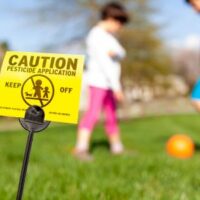Child Danger: Pesticides

While we all understand that pesticides are poisons that can be dangerous to anyone, many parents do not realize that 13 percent of all poisoning incidents involving children occur in someone else’s home. If your child suffers from pesticide poisoning in the home of a friend or neighbor, or perhaps at a park or daycare, what recourse do you have? An experienced personal injury attorney can answer this, and other questions.
Kids and Pesticide Risk
About three-fourths of homes without young children do not have their pesticides locked up. Unbelievably, nearly half of all homes where kids younger than age five live store one or more pesticides in unlocked cabinets within reach of a child—less than forty-eight inches from the ground. What kinds of pesticides are we talking about? Kitchens and bathrooms often contain things like wasp sprays, flea and tick shampoos for dogs and cats, chlorine bleach, and rat poison.
Accident Prevention Tips
Experts tell us there are a number of steps homeowners can take to protect little ones from accidental encounters with these poisons:
- Lock them up: They should be stored in locked sheds or cabinets out of children’s reach.
- Read Labels: Be sure to follow directions to the letter, and pay particular attention to restrictions/precautions.
- Remove kids during application: Children, along with their toys should be kept out of the area until the application dries or until otherwise recommended.
- Keep poisons in original containers: Don’t give kids the chance to interact with a deadly substance because they mistake it for something else.
- Keep insect/rodent baits out of reach: Make sure others in the home are aware of their placement, too.
- Teach kids: Be sure children know that pesticides are poisons and not to be touched.
Dangers Outside Your Home
As noted earlier, more than one in ten child accidents involving pesticides occur outside the home—in yards, day cares, parks, and in other homes. That’s why educating your child is so important. But young children cannot always understand the importance of information related to pesticides, so when potential hazards exist outside your home, and oftentimes they don’t even realize they’ve come into contact with a dangerous substance. They crawl or play on a surface with recent pesticide treatments or touch something and then put their hands in their mouths. Then they experience headaches, tingling, muscle twitching, or dizziness. So what happens after the unthinkable occurs?
Personal Injury Lawsuit
The suffering experienced by a child will not disappear with a financial settlement—but the bills associated with care will. Additionally, a successful lawsuit could cover future potential earnings, pain and suffering and more. To discuss the options moving forward, contact the experienced Baltimore personal injury attorneys at the Law Office of Hasson D. Barnes.
Resources:
epa.gov/sites/default/files/2015-05/documents/playitsafe.pdf
mda.maryland.gov/plants-pests/Pages/pesticide_child_safety.aspx
